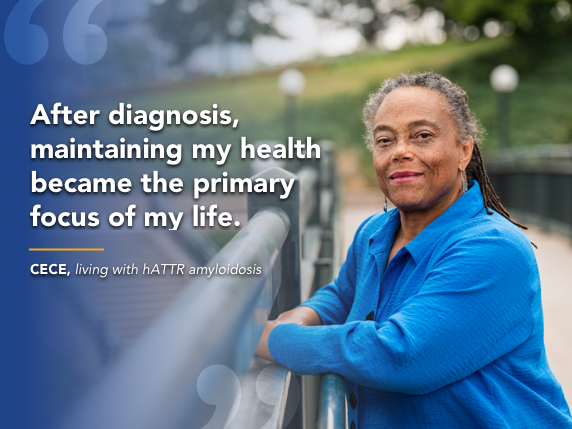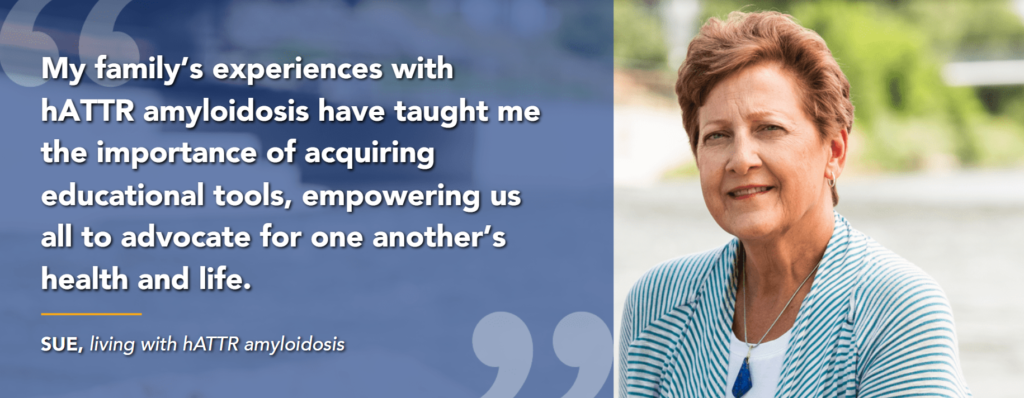People of Portuguese Descent Disproportionately Affected by a Rare, Inherited, Rapidly Progressive Disease

Hereditary ATTR (hATTR) amyloidosis is a rare, genetic condition that affects an estimated 50,000 people worldwide.
hATTR amyloidosis is caused by a gene change, or variant, that affects the function of a protein called transthyretin (TTR). In hATTR amyloidosis, the TTR gene change causes the protein to take on an abnormal shape and misfold, which causes the TTR protein to build up in various parts of the body, including the nerves, heart, and digestive system.
Symptoms related to the nerves can cause numbness, tingling, and burning pain in hands and feet. Symptoms related to the heart can cause shortness of breath, and leg swelling. Digestive symptoms may include diarrhea, severe constipation, nausea, vomiting, and unintentional weight loss. This is not a complete list of symptoms that may be experienced in patients with hATTR amyloidosis. Each patient has a different experience, and you may not experience all of these symptoms, or you may not experience them at the same time. Although anyone can be at risk for this disease, it is more common for people of certain ethnicities, such as those of Portuguese descent, including Brazilian, Cabo Verdean, Guinea-Bissau, Mozambique, and others.
Northern Portugal has the largest cluster worldwide of individuals living with hATTR amyloidosis. Nearly 1 in every 1000 Portuguese originating from Póvoa de Varzim and Vila do Conde may be affected by the disease. Nationwide, approximately 1 in every 4,000 people in Portugal may be affected by hATTR amyloidosis, putting Americans of Portuguese descent at a higher risk for this hereditary disease. People of Portuguese descent experience earlier onset symptoms, with 87% experiencing symptoms before age 40. There are more than 120 gene variants known to be associated with hATTR amyloidosis. Individuals of Portuguese descent have a high prevalence of the V30M variant, which is the most common and associated with nerve symptoms of numbness, tingling, and burning pain in hands and feet.

As a hereditary disease, hATTR amyloidosis is passed down through family members. If one parent has hATTR amyloidosis, each child will have a 50% chance of inheriting the variant from that parent. However, inheriting the variant does not necessarily mean that they will develop hATTR amyloidosis.
Despite this family connection, hATTR amyloidosis is often misdiagnosed because its symptoms resemble those of other conditions and can vary widely among people even with the same variant. Symptoms may worsen over time, so it’s important to talk to your doctor to determine the right plan of action. This may include referring you to a doctor with experience managing patients with hATTR amyloidosis or recommending you work with a genetic counselor. A genetic counselor can help you learn more about the genetic testing process and if a genetic test may be right for you.

You can request to speak with an Alnylam Patient Education Liaison (PEL)* who can answer questions you may have about hATTR amyloidosis at www.hATTRPEL.com.
You can also access educational resources and information about hATTR amyloidosis at www.hATTRbridge.com.
*Alnylam Patient Education Liaisons (PELs) are professionals with backgrounds in nursing who can answer questions about hereditary ATTR (hATTR) amyloidosis and provide educational resources to help you and your family learn more about the condition.
• The purpose of Alnylam PELs is to provide education to patients, their families, and caregivers
• PELs are employees of Alnylam Pharmaceuticals. They are not acting as healthcare providers and are not part of your healthcare team
• PELs do not provide medical care or advice
• All diagnosis and treatment decisions should be made by you and your doctor
Talk with your doctor about any concerns or symptoms you might be experiencing, and to understand their recommended course of action. The hATTR Amyloidosis Doctor Directory can help you find a doctor experienced in managing patients with hATTR amyloidosis in your area.
Content sponsored and provided by Alnylam Pharmaceuticals.

Alnylam Act, The Bridge, and their associated logos are trademarks of Alnylam Pharmaceuticals, Inc.
© 2022 Alnylam Pharmaceuticals, Inc. All rights reserved. NP-USA-00348-V2
